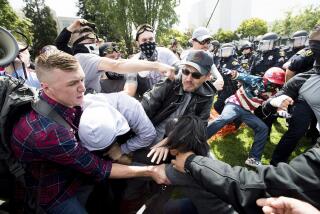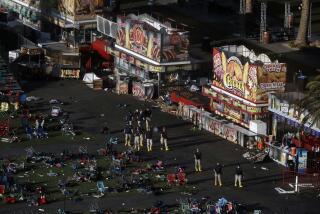O.C. Anti-Gang Tactic Ruled Unconstitutional : Courts: Westminster ban on 49 young men appearing together in public violates First Amendment, judge says.
SANTA ANA â Struggling to balance constitutional rights with the needs of a society that he said was near disintegration, an Orange County Superior Court judge Monday threw out a ban prohibiting four dozen members of a Westminster gang from associating with each other.
In an important test case for the county, Judge Richard J. Beacom often appeared sympathetic to the cityâs efforts to fight its growing gang problems, saying in the course of a three-hour hearing that âweâre on the edge of anarchy . . . near a breaking point.â
But he nonetheless characterized the anti-gang ban put in place just last month as an âimpermissible invasion of privacyâ under the First Amendment to the Constitution.
Officials in Westminster, the first city in Orange County to try to stop gang members from congregating in the streets, said the ruling stripped them of a powerful weapon against crime, and they may appeal it. But civil libertarians said the decision marked an important affirmation of constitutional principles--even in a community racked by violence.
âI donât believe there is a conflict between safe streets and the constitution,â said Mark Silverstein, an American Civil Liberties Union attorney who argued the case on behalf of 49 young Westminster men whom police identified as members of the West Trece gang.
Deputy Dist. Atty. John S. Anderson said he was exploring various options in the wake of the judgeâs decision, but hadnât decided whether to appeal the ruling.
But he vowed to continue the fight against gangs and said civil court orders âwill be tried againâ in Orange County. Anderson said the city may seek to have the case heard again by another judge, noting that Beacom is due to retire soon.
âWe will pursue gangsters as aggressively as possible under the law,â he said. âGang life is over in Orange County, and itâs time gang members got that message. Period.â
Before Beacom ruled, Anderson offered to modify the order by excluding members of the same family from the ban on association, negotiating the boundaries of the area, and allowing gang members to congregate during the relatively trouble-free hours of 6 a.m. to noon.
But Silverstein, citing the constitutional principles at stake, said he was unwilling to negotiate the issue. And Beacom, left with little room for compromise, surprised some court watchers by throwing out the anti-gang ban in its entirety.
A temporary restraining order that was issued June 30 originally prohibited the named defendants from âstanding, sitting, walking, driving, gathering or appearing anywhere in public viewâ with each other in a 25-square-block area of Westminster. It applied to young men, ranging in age from 13 to 30, who were said to be members of the West Trece gang.
âI knew they couldnât take our rights like that . . . just to keep us from hanging out,â said one of the defendants, Cesar Garcia, 18, an admitted member of the gang.
In addition, the original court order banned the defendants from committing a number of criminal offenses, including trespass. Anyone disobeying the order was subject to a charge of criminal contempt and subject to six months in jail if convicted.
The strategy, said Anderson, was to enable police to arrest gang members before they committed any crime, âto stop the pillaging of this community before it happened.â
Although none of the defendants had been cited for violating the ban since it went into effect, the prosecutor said gang activity in the area dropped almost to zero.
âWeâll see what happens now,â Anderson said.
A number of other California jurisdictions have used such civil court orders to combat gangs, including Burbank, San Jose and Los Angeles.
In a key early test of the strategy, the city of Los Angeles saw its anti-gang measure struck down in court in 1987 because a judge declared it overly broad. But since then, Los Angeles and other Southland municipalities have put in place more narrowly defined anti-gang restrictions that have all passed legal muster.
The primary difference between those orders and the Westminster measure, according to Los Angeles Deputy City Atty. Jule Bishop, a gang specialist, is that none of the other orders banned simple association, as Westminster sought to do.
âI am very, very disappointed, because weâre concerned about the rights of the citizens in that neighborhood to live free of fear and drive-bys and crime,â said Westminster Mayor Charles V. Smith.
âThey have the right to life, liberty and pursuit of happiness without fear of gangs,â he said. âIt seems that too often the ACLU and the courts are more concerned about the rights of the criminals than the rights of the (residents) to walk on the streets. This was a very powerful tool that had already begun to break the back of this particular gang.â
Westminster police officials, who were in the courtroom for the hearing, declined to comment on the judgeâs decision.
The judge said he was sympathetic to the plight of residents in gang areas. âI read the papers,â Beacom said. âPeople donât go out on the street anymore,â he said, and residents have a right to watch television in their homes âwithout bullets flying in.â
Citing rising county murder statistics and a weekend gang shooting in Stanton that left a 14-year-old boy dead, the judge spoke directly and harshly to defendants in the case several times during the hearing. More than a dozen young men, many with gang tattoos and wearing sunglasses, sat in the back of the courtroom after being scanned by portable metal detectors and occasionally laughed at the proceedings.
âYou guys think itâs funny, donât you?â the judge asked the defendants. âThatâs why weâre here.â
Beacom said he could find in court documents no âlegitimate purposeâ or âredeeming social valueâ for the gang, which Westminster police said evolved over 60 years from a dance club to a car club and finally to a criminal enterprise.
The gangâs only purpose, Beacom said, is to exert complete control over a sector of the community, using âterror and intimidation. They rob, pillage, rape.â
âThis is not an academic problem,â the judge said. âThe harm that theyâre doing is just incredible.â
Yet even as the judge branded the gang âa terrorist organizationâ that had âno lawful purpose,â he said that âthe right of association is the critical thing. . . . That is the essence.â
Beacom did not expand at length on his reasoning, but he did say that the constitutional guarantees to free association cannot be sacrificed for the expediency of fighting crime.
At times, the hearing sounded more like a philosophical debate than a legal proceeding, with all participants grappling for answers to seemingly unanswerable questions.
âI have a concern that if something doesnât happen, that law-abiding citizens will take matters in their own hands,â the judge said. âThere is a vigilante mentality within our community.â
Anderson, the prosecutor, said the civil restraining order was an absolute necessity to control the gangs, adding that âthe criminal law is just not working. . . . The current state of affairs is inadequate.â
But Silverstein of the ACLU said an unconstitutional ban on association was not the answer.
âThere is no doubt that something must be doneâ about graffiti, drive-by shootings and other gang violence, he said. âBut is this the appropriate remedy?â
Times staff writer Alicia Di Rado contributed to this report.
More to Read
Sign up for Essential California
The most important California stories and recommendations in your inbox every morning.
You may occasionally receive promotional content from the Los Angeles Times.










